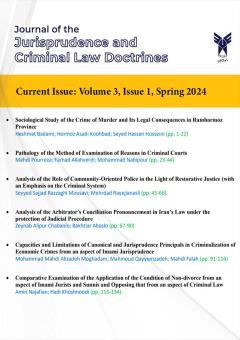Iran’s Policy-making in Anti-Contraband and Foreign Currency Smuggling in the Mirror of Analysis and Criticism
Subject Areas : Jurisprudence and Criminal Law DoctrinesAhmad Pourebrahim 1 , mehdi haghighatjoo 2
1 - Assistant Professor, Department of Law, Rasht Branch, Islamic Azad University, Rasht, Iran
2 - Assistant Professor, Department of Law, Rasht Branch, Islamic Azad University, Rasht, Iran
Keywords: smuggling of goods and foreign currency, criminal policy of smuggling of goods and foreign currency, prevention of smuggling of goods and foreign currency.,
Abstract :
The phenomenon of smuggling in Iran’s country, in addition to economical bad effects is an important social and the economical challenge. Nowadays, this phenomenon besides as a serious threat on the path of free commerce, is imposing so much expenses on the economical body of country. Must acknowledge the new statute has many innovations and corrects many deficiencies in previous statute; although »Anti-Trafficking Law ratified 1392« had not the sufficient and necessary sanction. Therefore, in new expressions, the sanctions of this statute were fortified from different aspects. On the other hand, the smuggling subjects were ambiguous and sometimes the act of smuggling was considered with title of under invoicing or false statement that in correction of statute, many differences of weight of goods or false statement is considered as smuggling. This article with analytical descriptive method, continues the criminological and preventive approaches in subjects of smuggling goods and foreign currency while surveying existing ambiguities and challenges in this field and analyzed the action and reaction criminal policies for prevention.
1. بالاپژوه، ابراهیم، (1391)، «مبانی فقهی و حقوقی قاچاق در اسلام و آثار آن»، پایاننامه¬ کارشناسی ارشد، دانشکده علوم حدیث.
2. پارسا، فرزاد، حفیدی، وریا، (1397)، «جرم¬انگاری و مجازات قاچاق کالا و ارز در فقه مذاهب اربعه و قانون»، با تأکید بر قاعده¬ تعزیر، دوفصلنامه¬ مطالعات تطبیقی فقه و اصول، سال اول، شماره 1، 15ـ1.
3. پارسا، فرزاد، (1397)، «قاعده¬ تعزیرات و تبیین رابطه¬ آن با قانون مبارزه با قاچاق کالا و ارز»، مجله¬ اقتصاد پنهان، سال دوم، شماره 3ـ4، 26ـ9.
4. پورقهرمانی، بابک، (1401)، «مبانی فقهی و حقوقی جرمانگاری قاچاق و کالا و ارز در ایران»، مجله آموزه های فقه و حقوق جزا، دوره 1، شماره 2، 21.
5. جمالی، محمد، (1396)، «قاعده¬ ترجیح منافع عمومی بر منافع خصوصی و دلالت آن در بررسی قاچاق کالا و ارز»، مجله مطالعات تقریبی مذاهب اسلامی، سال دوازدهم، شماره 47، 40ـ25.
6. سامانی، اسماعیل شهاب، (1390)، «احکام کالای قاچاق در فقه امامیه و حقوق ایران»، پایان نامه کارشناسی ارشد.
7. عابدیان، سید حسن، ارمک، محمدرضا، (1396)، «بررسی احکام فقهی خرید و فروش کالای قاچاق از منظر ایجاد اختلال نظام»، مجله حکومت اسلامی، سال بیست و دوم، شماره 83، 58ـ33.
8. قطبی، میلاد، (1402)، «بررسی ظرفیتهای فقهی در مبارزه با قاچاق کالا و ارز»، مجله¬ اقتصاد پنهان، سال اول، شماره 2، 180ـ153.
9. محسنی والا، رضا، (1398)، «اعتبار و بطلان مصرف کالا و ارز از منظر فقه و حقوق اسلامی»، مجله مطالعات فقهی و فلسفی، سال دهم، شماره 37، 28ـ1.
10. مقدادی، محمد مهدی، میرزاده اهری، سید مرتضی، (1401)، «قاعده¬ حرج در حوزه قاچاق کالا و ارز»، مجله فقه حکومتی، سال چهارم، شماره 7، 107ـ83.
11. ملایی کندلوس، فخرالله، حریری، آزیتا، ذکائیان، پرویز، (1400)، «بررسی و تحلیل مبانی فقهی حرمت اخلال در نظام اقتصادی و رابطه آن با امنیت اجتماعی و ملی»، مجله¬ پژوهشهای جامعه¬شناسی سیاسی، سال چهارم، شماره 14، 371ـ384.
12. ورایی، سید جواد، (1394)، «آیا جرم در حکومت اسلامی همیشه گناه است؟»، مجله فقه و مبانی شریعت اسلامی، شماره 48، 180ـ153.


